New York City Beats Alaska In Unionized Worker Rates
This may, or may not, surprise union champion Sarah Palin in her war against the coastal elites. “A new study done by researchers at the City University of New York found that the overall unionization rate in New York was 24.9 percent, more than double the national rate of 12.2 percent. In New York City, the percentage of wage and salary workers belonging to unions was 24.6 percent.”
Lets Pretend For A Moment That Robots Will Not Destroy Us
Most of the robot coverage at the Awl focuses on the prospect of a future when we humans are enslaved by machines. While this horrifying scenario seems right around the corner, unless they choose instead to simply exterminate us, let’s take a moment to marvel at the engineering brilliance that has brought us to such a precipice. That is not a little man dancing in a space suit. It is Honda’s Asimo, the world’s leading humanoid robot. You may have seen it in this incredible commercial from last year.
“Asimo” stands for Advanced Step in Innovative Mobility. And Honda is making a big show out of it, or him or whatever, this week at the 2010 Ars Electronica festival in Linz, Austria. As Scientific American reports, “The company understands that if androids are to play an integral role in the future of the human race (and justify Honda’s substantial investment in the technology), they are going to need social skills to keep the “creepiness” factor at bay.” Satoshi Shigemi, large project leader of ASIMO development at Honda R&D; Co., Ltd., says, “People need to be able to comfortably communicate with the robot so that it can react properly to their commands and carry out their wishes when assistance is needed.” I don’t know that this demonstration makes me more comfortable with the idea of a world filled with 4-feet-tall, 120-pound electronic spacemen that are a million times smarter than me-and presumably water resistant by the time it goes down. But still, it’s super-cool to watch.
A Brief Guide To Famous Rakes

“In the realm of freaks Samuel M. Steward was a God… His first adventure in celebrity cock took place between the legs of Hollywood heartthrob Rudolph Valentino. Mr. Valentino was only the first in a string of A-List lays. In years to come, Mr. Steward would sleep his way through entire literary circles, fucking everyone from Thornton Wilder to Lord Alfred Douglas, Andre Gide’s houseboy to Jean Genet’s former lover. He also shagged his fair share of Hollywood types, among them a young Rock Hudson, whom he blew on a freight elevator during the holidays at Marshall Fields.”
–And what did you do with your life?
Young Brits Proud Of NHS
The kids are alright: A survey of 2000 Britons aged 18–24 “found that one in three young adults thought it was acceptable to wake up without knowing how they got home after a drinking session and one in 25 believed it was OK to end up in hospital.”
The Return of Michael Pitt!
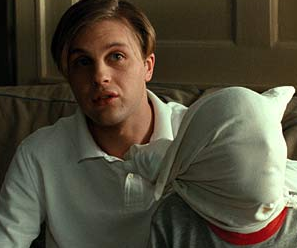
I had not realized that HBO’s “Boardwalk Empire” had retained the services of Michael Pitt in the role of Steve Buscemi’s protege. Pitt’s work can most often, these past few years, be viewed solely under the JMZ elevated, as he struts along in a t-shirt that displays his scars and tattoos and his tight filthy jeans with the rocker belts. How reclusive is he? His band’s website only plays music; it has no words or, you know, gig announcements. He has not made a movie since Funny Games. But here he is on the HBO: “Mr. Pitt was simply made for the fashions of the 1920s, with his big DiCaprio-y cherub face and creepily empty eyes.” He’s the DiCaprio of opposite-land. He’s always seemed like he might just slip off the planet and disappear for good. So my anticipation level has tripled.
Piece Of Debris Back At Hole In The Ground
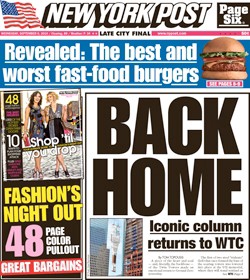
The New York Post takes time out from Muslim-bashing to celebrate the return of a clump of wreckage to America’s holiest permanent construction site. The paper uses the front page to relate how the “first of two steel ‘tridents’ that once formed the base of the soaring towers was lowered into place at the 9/11 memorial, where they will stand sentinel as poignant reminders of the missing skyscrapers.” I guess it’s okay that the paper can fetishize a couple of chunks of rubble in the service of commemorating a tragedy. It would be even nicer if it could be as compassionate about the rescue workers who risked their lives down at the site during the event but who are now castigated as leeches of the state for receiving the retirement benefits they were offered so many years ago.
Condiments! The Exciting Story of Our Best Friends (And Worst Nightmare)
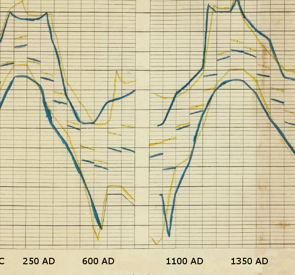
“During the long decline and transformation of the Roman Empire, condiments entered into a dark age of their own. Roman roads, and more importantly, the Roman view on trade, spread the building blocks of condiments across Europe. Salt, sugar, and vinegar are all processed goods, and the collapse of the system that had processed them so effectively — and hastened their safe movement — left Europe without the infrastructure to make condiments, even if they had wanted to. The West was left without the vast machine that had sustained the fish sauce and vinegar industries; condiment usage retreated east to the chutney of India and the soy and fish sauce of China and Southeast Asia.” What’s all this, you ask? Only the greatest thing you’ll read all day, a very brief history of condiments since ancient Rome. It’s PART ONE in a SERIES! (via)
How Scratch-Off Lottery Tickets Have (Not Yet) Changed My Life
by Beth Boyle Machlan
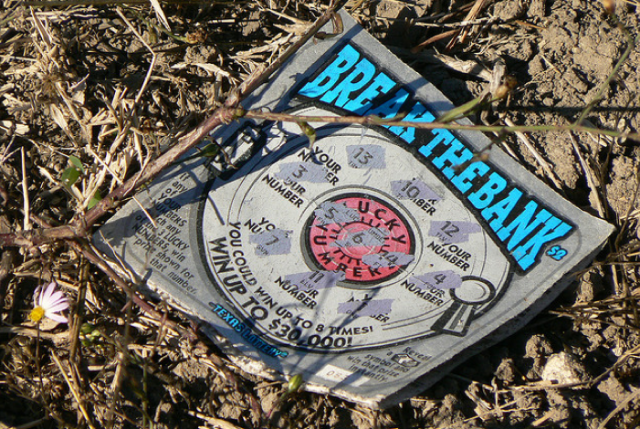
“Loose Change” or “Amazing Eights”: that’s a one-dollar play with a maximum win of $500-or half of what I owe this month. “Lemon Twist” or a crossword: that’s two dollars to fix my car and kill off one of my Visas. Five dollars buys me a “Black Series 2” or a “Millionaire Madness.” Either one would bring me back to baseline, make me someone who pays her phone bill on time and maybe once a year goes on vacation. A “Platinum Payout” costs ten dollars (eek), but I could both break even and buy a house-not a big one, but that’s okay. Yes, I know, Megamillions costs just a dollar and a dream, but I don’t have time for dreaming. This is a plan-a serious financial plan. One $2 scratch-off lottery ticket is all that lies between me and solvency, and $5 could buy me success.
As far as the world is concerned, I’ve already won the lottery. My children and I are healthy, not hungry or homeless. I have a good job, a loving family and partner and great friends. So it’s easier to ignore the statistics telling me I’m more likely to die in a plane crash or be blown up by a terrorist than I am to win a lottery jackpot. I’m not trying to get ahead so much as catch up, refresh the page. For someone who assigns herself only a 50/50 chance of surviving plane flights anyway, scratch-off lottery cards-magic wands that only work .001% of the time, roll after fat roll of golden tickets that admit the holder to absolutely nowhere-make perfect sense. Hell, education got me into this. Maybe foolishness can get me out.
It helps that I waited until I was 40 to move to New York. My hopes aren’t as high as they used to be, mainly because I know the difference between what I want and what I can actually do. My reasons for coming here are, compared to most people’s, sadly rational; I just wanted to spend less time commuting and more time with my boyfriend and kids. The electric giddiness New York used to elicit in me every time I climbed, blinking, out of Grand Central into a night striped with skyscrapers? Long gone. Now it’s just next in a number of places-Princeton, Portland, Buffalo-where I’ll dream of Being Happy, but I’ll settle for Not Sad. If the city still has magic, it shouldn’t waste that wonder on me.
Besides, I’m not really new here. I was born in Brooklyn in 1970, and my parents moved to Westchester in 1972. Twenty years later, post graduation, I commuted from their house to a marketing job in midtown. I ran away to Maine after seeing a long line of weary people block a seeing-eye dog and his owner from boarding an escalator near the 6 train. (The dog looked frantic, the man resigned.)
Now my brother lives in Riverdale, a stone’s throw from the apartment building where my grandmother died, and I’ve come to Carroll Gardens, the Italian answer to Bay Ridge, where my dad and I were born. I often wonder what my grandparents would say about my brother and me returning to the city they worked so hard to get us out of, but perhaps New York’s most enduring quality is the way it keeps us wanting. The Plaza palace my Eloise self craved at 6 became a 5th Avenue pied-a-terre at 12 (belonging to my friend’s divorced dad), a Soho loft at 16 (school-sponsored gallery crawl), and then a West Village garden apartment at 23 (housesitting). Then I left. By the time I was ready and able to come back, just this summer, people like me wanted Brooklyn brownstones. So that’s what I have-the ground floor of a Brooklyn brownstone, rather, what the broker referred to as a “garden apartment” and my no-fee mother calls a “basement.”
Is living in the basement of your dream house better or worse than not living in it at all? Beats me. These days, I’m way more focused on cleaning up my past than transforming my future. The type of cleaning depends of course on the crime committed; after six years of separation, my divorce is final, I’m up to date on apologies and a recent physical gave the all-clear for all possible cancers and cooties. Just one mess remains, that dark tower of steadily growing debt, which is apparently immune to apologies and antibiotics. Worse, it’s also immune to on-time minimum payments, and (since the bulk is student loans) to bankruptcy. The sad thing is that, other than education, I can’t even remember what I bought, or thought I needed. Nor am I sure when I started running the American Dream in reverse. All I know is that in spite of her upscale upbringing and four degrees from name-brand schools, the Irish girl is back in a Brooklyn basement, overeducated and utterly screwed.
It’s possible to romanticize poverty. It is not possible to romanticize debt. If they could foreclose on my education like a house or a car, I’d happily pack it up, pull out my memories of each and every course-”Tudor and Stuart England,” “East Asian Art”-and leave them stacked neatly at the curb. (“Take my Ph.D.-please!”) Hell, I’d even downgrade, trade in my ivy and the New England Liberal Arts degree for any of your better state schools. But I can’t, and so I’m fucked. The concept of credit is based on a future brighter than the present; it assumes that your ship will come in. I can sit behind Fairway and scan the harbor until my eyeballs dry, but at this point I’m pretty sure none of those boats are mine.
As the Dead said, way more than once, I need a miracle.
* * *
Scratchies are, or purport to be, colorful cardboard game changers, small paper plot twists, mass-produced dei ex machinae. Scratchies offer the chance to jump genres in a matter of minutes, to move you and your family from a dark, damp naturalist novella to an airy four-story romance zoned for P.S. 58. For those of us who play regularly, the numerical near-certainty that we won’t win dick is no match for the allure of “what if?” Hell, everyone who buys a ticket knows they won’t win, but hopes they will. And some of them do. What does it feel like to be the exception, to look down at the card and see match after match, three pots of gold, three tiny flat black piles of cash followed by $25,000, $100,000, ONE MILLION? (I imagine they write that last one out; all the zeros wouldn’t fit on the card.) DDB Inc., the creative team behind the lottery ads, played this angle to great effect. It’s hard to resist the wheedling possibility of “Hey, you never know,” even when you kind of do.
Part of the appeal of scratchies is the illusion of control. There’s a ritual to them. Choose the vendor, choose the ticket, choose the private place to scratch (as when scratching your ass, you don’t want anyone you know to see you), choose the coin with which you’ll dig a tiny pile of gray dust to find, almost always, that you’ve lost again. But that’s the thing-you haven’t lost, not really, because other than pocket change nothing you had is gone. In the odd logic of lottery players, we can only win.
Of course, not all tickets are created equal. To a scratchy addict, playing Megamillions or Powerball seems boring, even fiscally conservative. Yes, the jackpots are bigger, but the chits are thin and colorless and the wait until the drawing interminable-more like planning for retirement (yawn) than playing a game. Scratchers need the right now, the feeling of mastery that comes with choosing and defacing the surface of what could be a whole new world. Spooled like tape or ribbon behind a thin panel of plastic, the scratchies look to me like I imagine cash register candy looks to a hungry, irritable child-an easy panacea-a way to even the score for all the indignities of the last hour, day or decade. There have been bad days when I’ve bought ticket after ticket from the same bright skein, stubborn as a toddler, certain for whatever asinine reason that today, I deserve to win. I once bought thirty dollars’ worth of my favorite $3 game, climbed to a lofty place suitable to what I believed was an epic occasion, and scratched away, my conviction decreasing in direct proportion to the gray shards accumulating in my lap, revealing… nothing. Not even a one-dollar win. That broke me for a week or so, but not for good.
Like most high-functioning addicts, I keep my habit to myself. The few discussions I’ve had with friends who also play reveal an almost universal association between their ticket purchases and their mood. Some buy scratchies when all is well, because they feel lucky. Others play when they feel down, for the cheap hit of serotonin that anticipation provides. Almost all have a ritual; almost all play regularly, regardless of their income, or lack thereof, although their definition of regular varies from “once a month” to “twice a day” (no one confessed to more than that). The one anecdote I heard otherwise may be apocryphal: a statistics professor who bought a single scratchy to use in a lesson on probability ended up winning $20,000. I believe it. And I hate him.
My fantasy of what will happen if I win is, in its own way, as sadly rational as my move to New York. There’s no champagne or limousines or dinner at Per Se, just me at my desk with my checkbook and a stack of bills. I neatly and methodically plow through them, paying each in full.
I imagine calling up Sallie Mae to ask how they prefer I make my final payment, seeing as it’s such a large amount-wire transfer, perhaps? Cashier’s check? I imagine the operator’s initial disbelief, and how my calm demeanor eventually convinces her to take my picture off the Most-Wanted wall and close my account for good. With apologies to Prospero and the magical islands of New York, these mundane moments are the stuff my grownup dreams are made on. Only after visualizing that pile of paper gone do I allow myself less pragmatic fantasies, like a walkthrough of my most recent dream house. It is, of course, a tastefully-renovated brownstone in the historic district just a few blocks from my basement, and offers a gourmet kitchen, a paneled library-ooh, with one of those ladders that runs on a rail!-and a whole bright floor for my daughters. Through the fanlight on the third-floor landing I can see Brooklyn Harbor, where a small boat laden with all my accidents chugs away from my new world. I watch for a while as it beats on against the current, back into the past where it belongs.
Beth Boyle Machlan was born in Bay Ridge, Brooklyn and now lives in Carroll Gardens with her daughters. Her writing about architecture and fiction has appeared in academic journals; her writing about herself has been featured on Nerve.com and The Faster Times. She recently appeared in Representing Segregation: Toward an Aesthetics of Living Jim Crow, and Other Forms of Racial Division. She teaches in the Expository Writing Program at New York University.
Photo from Flickr by Terry Ross.
Gawker Media Now Bigger Than All Newspapers Online -- Except One
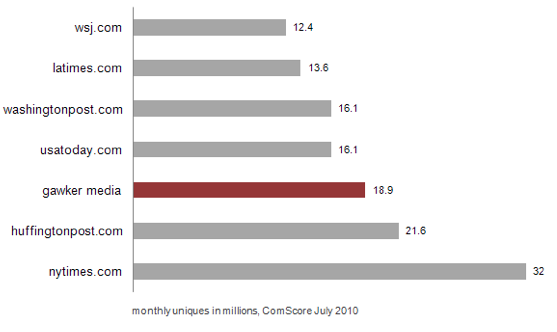
The latest traffic memo arrives from Gawker Media honcho Nick Denton: in it, Comscore shows that his network of sites is bigger than any newspaper online but the New York Times. That being said? “The newspapers are now the least of our competition. The inflated expectations of investors and executives may one day explode the Huffington Post. And Yahoo and AOL are in long-term decline. But they are all increasingly in our business.”
From: Nick Denton
Date: September 7, 2010
Subject: Gawker Media would be the second largest online newspaper
A quick note to start off the new internet year. This is usually the strongest season for internet media: the period from the return to school in September through to the big tech shows in January. And we have a particularly good base this year — because last month was excellent.
It’s not that we benefited from any gigantic stories. The top 10 are the usual mix of helpful (how to opt out of Facebook Places) and surprising (Greek statues were tacky, Justin Bieber sounds cooler slowed down) and gratuitous (yet more athlete dong.) Take a look through the whole list of the Top 100 (linked below) for more examples of stories that struck a nerve.
But it seems that — even if there were few home runs — you were scoring more singles. Most sites were substantially up on a year ago. The US audience of Jalopnik, Jezebel, Gizmodo, Gawker, Lifehacker and Kotaku all grew by 30–60%. And a special mention to io9, which was up 118% on August 2009.
The network as a whole drew 17.8m domestic visitors for the month. Let’s put that in context. How do we stack up, against the established names in online news. Last time we measured ourselves against the traditional newspapers’ online operations, we were fourth. But we’ve overtaken both the Washington Post and USA Today, according to Comscore. And, in this category, we’re behind only the New York Times.
A note of caution, however: the newspapers are now the least of our competition. The inflated expectations of investors and executives may one day explode the Huffington Post. And Yahoo and AOL are in long-term decline. But they are all increasingly in our business. And we have a long way to go before we can surpass them.
One other note. We don’t talk about it that much. But advertising sales hit a new record in August — which is usually a rather lackluster month. That’s largely down to the increasingly slick marketing collateral and creative services execution — and tireless salesmanship. But I think we may also be benefiting already from audience growth this year and buzz from stories such as the iPhone 4 scoop.
The Laughs From Knifecrime Island
“So, with a heavy heart, and virtual-tarp to fend off any rotten fruit thrown my way, I present to you an incomplete and completely subjective breakdown of the best and most influential British comedy television.” Up first: “The Benny Hill Show.”
